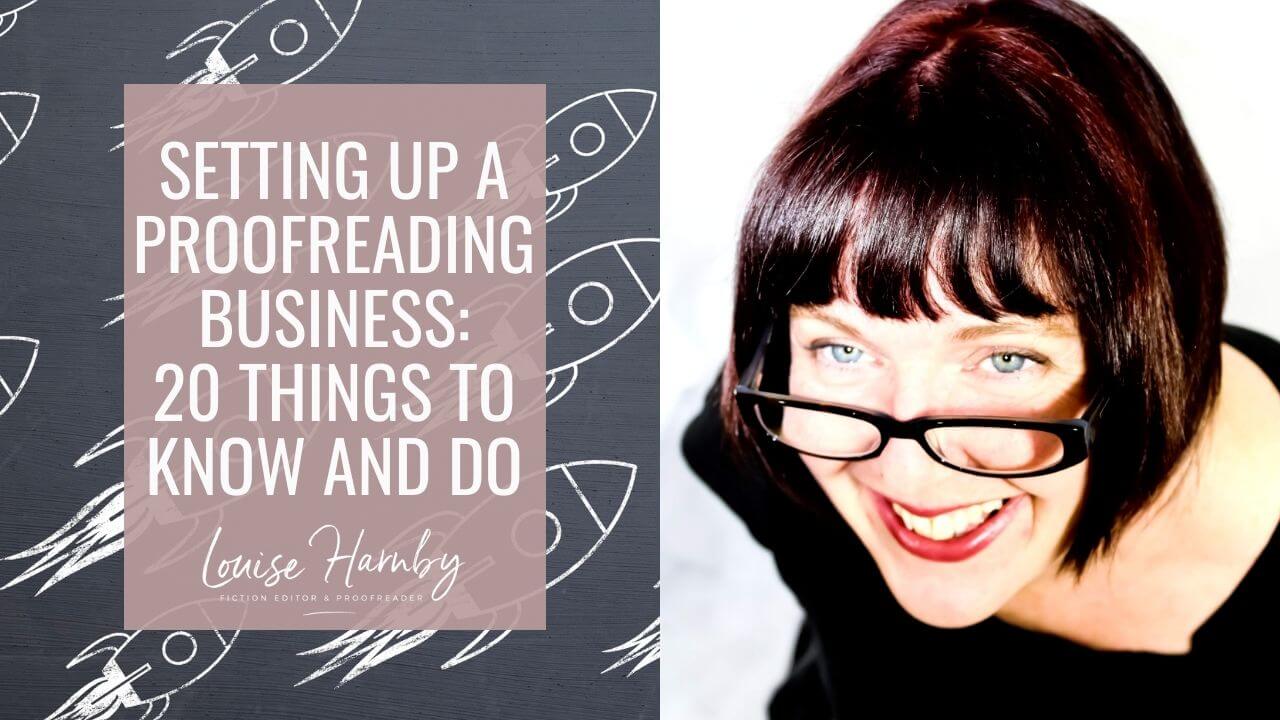To set up as a freelancer, decide on your niche and register your business. Create a portfolio to showcase your work.
Starting a freelancing career involves several crucial steps. First, identify your skills and choose a specific niche to focus on. This helps you stand out in a crowded market. Next, register your business to comply with legal requirements. This may involve choosing a business structure and getting necessary permits.
Building a strong portfolio is essential to attract clients. Include your best work samples and testimonials. Establish an online presence with a professional website and active social media profiles. Networking is key, so join relevant communities and attend industry events. Finally, manage your finances carefully, including setting rates and keeping track of expenses.

Credit: www.louiseharnbyproofreader.com
Embarking On The Freelance Journey
Starting as a freelancer can be exciting and challenging. You gain freedom and flexibility. You can work on projects you love. Yet, it’s important to prepare well. This guide will help you get started.
Assessing Your Skills And Services
First, understand what you can offer. Make a list of your skills. Think about what you’re good at. Are you a writer, designer, or coder? Write down all your talents.
Next, decide which skills to sell. Focus on what you do best. This will be your core service. You might have more than one service. But start with your strongest skill.
Here’s a simple table to help you:
| Skill | Experience Level | Interest Level |
|---|---|---|
| Writing | Expert | High |
| Graphic Design | Intermediate | Medium |
| Web Development | Beginner | Low |
Identifying Your Niche Market
Next, identify your niche. A niche is a focused area of your market. It helps you stand out. To find your niche:
- Look at your skills list.
- Think about who needs those skills.
- Research competitors in that area.
Pick a niche where you can shine. For example, if you are a writer, your niche could be tech blogs. Focus on a small, specific market.
Here are steps to identify your niche:
- Analyze your interests and skills.
- Research potential markets.
- Choose a niche with less competition.
Once you find your niche, target your marketing. Tailor your services to that niche. This way, you attract the right clients.

Credit: www.creativelivesinprogress.com
Legal And Financial Foundations
Starting as a freelancer involves more than just finding clients. You need to set up the right legal and financial foundations. This ensures your business runs smoothly and complies with laws.
Choosing Your Business Structure
Selecting the right business structure is crucial. It affects your taxes, liability, and other legal aspects.
- Sole Proprietorship: Easy to set up. You and the business are the same legal entity.
- Limited Liability Company (LLC): Offers personal liability protection. More paperwork than a sole proprietorship.
- Corporation: Best for larger businesses. Involves extensive paperwork and regulations.
Most freelancers start as a sole proprietorship or LLC. Consult with a legal advisor to choose the best structure for you.
Understanding Taxes And Invoicing
Handling taxes and invoicing is a key part of freelancing. Keeping track of income and expenses is essential.
- Register for an Employer Identification Number (EIN) if needed.
- Set aside money for estimated taxes quarterly.
- Use software like QuickBooks for invoicing.
- Keep receipts and documents for tax deductions.
Understanding these basics helps you avoid legal issues and stay organized. Proper invoicing ensures you get paid on time.
| Task | Tool/Action |
|---|---|
| Registering Business | Consult a legal advisor |
| Tracking Income | Use accounting software |
| Paying Taxes | Set aside funds quarterly |
Getting these legal and financial foundations right sets you up for success.
Crafting Your Personal Brand
Starting as a freelancer requires building a personal brand. A strong personal brand sets you apart and attracts clients. Let’s explore key steps to craft your personal brand.
Developing A Professional Portfolio
A professional portfolio is your digital resume. It showcases your skills, experience, and achievements. Include:
- Work samples – Display your best projects.
- Client testimonials – Positive feedback builds trust.
- Case studies – Show problem-solving skills and results.
Use clean, easy-to-navigate design. Ensure your contact details are visible. Update your portfolio regularly to reflect new skills.
Creating A Strong Online Presence
Having a strong online presence is crucial. Start with a professional website. Include:
- About Me – Share your story and expertise.
- Services – Clearly list what you offer.
- Contact Information – Make it easy for clients to reach you.
Leverage social media platforms. Create profiles on LinkedIn, Twitter, and Instagram. Share valuable content regularly. Engage with your audience to build relationships.
Consider starting a blog. Write about industry trends and insights. This positions you as an expert in your field.
Networking And Building Client Relationships
Building a solid network and nurturing client relationships are crucial for freelancers. These connections can lead to repeat business, referrals, and a steady stream of work. Below are effective strategies to help you in networking and building client relationships.
Leveraging Social Media Platforms
Social media platforms offer excellent opportunities to connect with potential clients. Here are some tips:
- LinkedIn: Create a professional profile. Join industry groups and participate in discussions.
- Twitter: Follow industry leaders. Share your work and engage with relevant hashtags.
- Facebook: Join freelance and industry-specific groups. Post about your services and successes.
- Instagram: Share visual content of your work. Use stories and reels to engage followers.
Attending Industry Events
Industry events provide a perfect chance to meet potential clients face-to-face. Here’s how to make the most of these events:
- Research events related to your field. Choose the ones with high attendance.
- Prepare business cards and a brief pitch about your services.
- Engage with speakers and attendees. Ask questions and share insights.
- Follow up with new contacts via email or social media after the event.
Consider these steps to strengthen your network and client relationships. A robust network can be your best asset as a freelancer.
Setting Up Your Workspace
Creating an efficient workspace is crucial for freelancing success. A well-organized, comfortable workspace boosts productivity and creativity. It helps maintain focus and separates work life from home life.
Selecting The Right Tools And Equipment
Choosing the right tools and equipment is essential. You need a reliable computer. A fast internet connection is a must. Consider ergonomic furniture. A good chair and desk reduce strain and increase comfort.
Software tools are also vital. Use project management apps. They help track tasks and deadlines. Communication tools like Slack or Zoom are helpful. They keep you connected with clients and team members.
Organizing For Productivity
Organization is key to a productive workspace. Keep your desk clutter-free. Use storage solutions like drawers and shelves. Label everything for easy access.
- Use a planner or calendar
- Set daily goals
- Prioritize tasks
Lighting is important too. Natural light is best. If that’s not possible, use a good desk lamp. Proper lighting reduces eye strain and boosts mood.
Personalize your space. Add items that inspire you. A plant, photos, or art can make your workspace enjoyable. This creates a positive environment, enhancing productivity.
Growth And Development Strategies
Starting as a freelancer is just the beginning. To thrive, you need smart growth and development strategies. These strategies help you stay competitive and increase your income.
Continuing Education And Skill Enhancement
Learning never stops, especially for freelancers. Constantly enhancing your skills is crucial. Here are ways to keep your skills sharp:
- Online Courses: Platforms like Coursera and Udemy offer various courses.
- Workshops: Attend both online and in-person workshops.
- Certifications: Get certified in your field to boost credibility.
Always be eager to learn something new. This makes you more valuable to clients.
Scaling Your Freelance Business
As your freelance business grows, scaling becomes essential. Here are some strategies to help you scale:
- Outsource Tasks: Delegate tasks to other freelancers. This allows you to focus on high-value work.
- Increase Rates: As your experience grows, so should your rates.
- Automate Processes: Use tools to automate repetitive tasks. This saves time and increases efficiency.
Scaling your business takes effort but pays off in the long run.

Credit: ashleygainer.com
Frequently Asked Questions
What Do I Need To Do To Start Freelancing?
Create a strong portfolio. Choose a niche. Set up a professional website. Network with potential clients. Use freelance platforms like Upwork or Fiverr.
How To Establish Yourself As A Freelancer?
Build a strong portfolio showcasing your skills. Use social media and freelance platforms to find clients. Network with industry professionals. Set competitive prices and deliver quality work. Continuously update your skills.
How Do I Set Up A Freelancer?
Sign up on a freelance platform like Upwork or Fiverr. Complete your profile with skills, experience, and portfolio. Set your rates. Apply to relevant job postings. Communicate clearly with clients.
How To Legally Be A Freelancer?
Register your business, obtain necessary licenses, and set up a tax ID. Create contracts and keep accurate financial records.
Conclusion
Setting up as a freelancer requires planning and dedication. Follow these steps to kickstart your journey. Ensure you have the right tools, a clear niche, and an online presence. Stay organized and continually market your services. With persistence, you’ll build a successful freelancing career.
Embrace the freedom and opportunities ahead.

